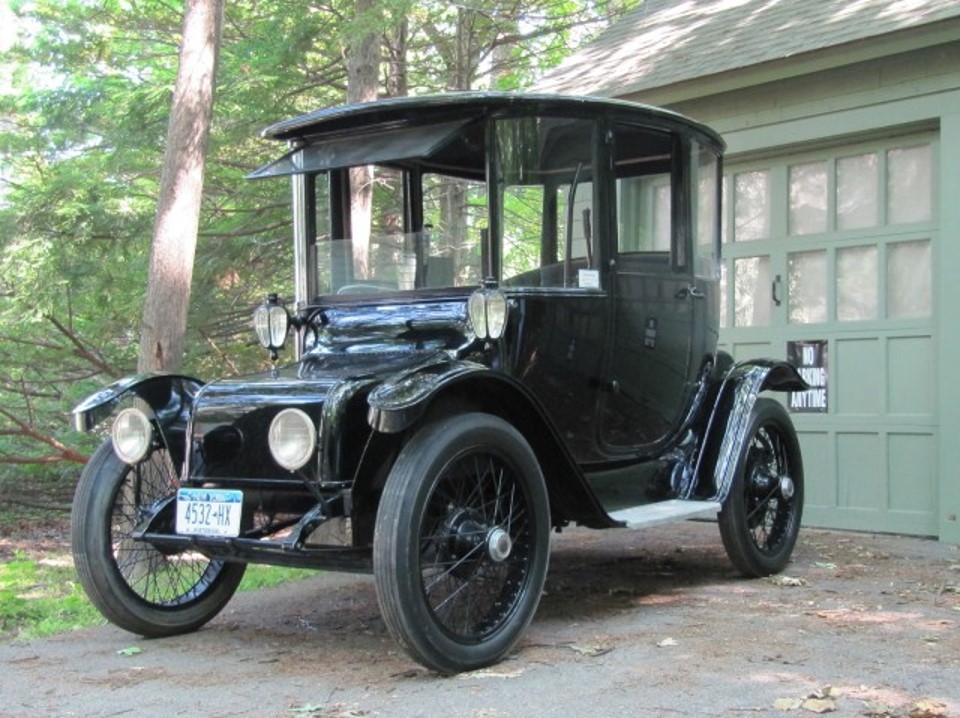Electric cars are set to dominate the worldwide automobile market. They account for more than a third of all cars on the road, and gas-powered cars are only 22 percent. The year is 1900, and both engine types will soon overtake primitive steam-powered vehicles, still 40 percent of the vehicles in America. Although Stanley Steamers rarely explode, many Americans fear they might, and their hissing noise scares the horses. The future of gasoline cars is also doubtful, owing to their unbearable noise, the dirty and dangerous job of hand cranking to start them, and the difficulty in finding gas.
Thomas Edison, who has electrified New York City literally, and the American imagination figuratively, has purchased a Baker Electric, and is touting the quiet and dependable nature of his lead-acid batteries as the future of transportation. Walter Bearsey designed a fleet of electric cabs in London and several companies followed in New York. Their short range is not an issue in the inner cities, and 12 miles an hour beats the horse-drawn carriages.

Fast-forward to 1910: 35 electric car companies are selling well in the U.S. The 1915 Standard Electric, using Westinghouse motors, boasts speeds of 20 miles an hour, though its $1,800 price limits it to wealthy buyers.
Electric cars held the land speed records until 1900, with French cars recording speeds of 39-57 miles an hour. The record was broken in 1902 by both steam and gas-powered cars and by 1904 Henry Ford’s gas-powered car was clocked at 91 miles an hour. Electrics were quiet, comfortable, and easy to drive, but they had challenges, too, primarily their high cost, slow speed, short battery range, and lack of charging stations (sound familiar?).
President Taft purchased the White House’s first cars in 1909, hedging his bets on which technology would prevail by purchasing a Baker Electric, two gas-powered Pierce Arrows, and a steam-powered White. Neither electric nor gas cars would dominate the market until their respective problems were solved. Baker announced grandiose plans to open charging stations at every major intersection in its hometown of Cleveland, and then quickly expand, but the cost was too high because electricity was not available on every corner in Cleveland. In fact, electricity was unavailable in most of America before WWI.
Conversely, what finally killed electric cars were three developments that catapulted the internal combustion engine into the hearts and pocketbooks of Americans. Ford’s introduction of the mass-production assembly line for the Model T allowed his cars to sell for half the price of electrics. Less well-remembered is the Reeves brothers’ invention of the muffler, which made noise levels acceptable. And most important and unsung, Charles Kettering figured out how to get the best of both technologies under one hood, by putting a lead-acid battery and electric starter in gas-powered cars. By 1919 virtually all cars had electric starters, even cheap Model Ts – no more hand cranking. That combined the ease and convenience of electric cars with the range, speed, and flexibility of gas cars. Improvement of highways in the 1920s further expanded travel distances and helped bury the electric car market, as did discoveries of large oil fields that made gasoline affordable and available everywhere.
The electric grid grew from covering 3 percent to over 35 percent of America by 1920, but during that time electric cars doubled in price, while 15 million Model Ts were sold because their price declined from $780 in 1908 to $260 by 1925.
What went wrong for electric vehicles a century ago were the same things that hold consumers back today. Former Virginia Attorney General Ken Cuccinelli created a great discussion last week by posting an interesting question about what would have happened had electrics won the battle in the 1910s, and internal combustion engines been invented or rediscovered now. As he said, the latter would be touted as vehicles with half the weight, half the price, refueled in a tenth of the time, with four times the range, and usable in all weather.
Surely the internal combustion engine would be celebrated as the wave of the future. But instead of learning from that rich history, today’s governments are openly defying it, as my friend and economist Steve Moore puts it, demanding that we that we “buy a technology that we’ve known for a century is inferior. This is the opposite of progress.”
Today’s all-powerful bureaucracies might ban the sale of gas-powered cars, or even the sale of gasoline itself. But in all fairness, we must understand the bureaucrats’ predicament. Such draconian edicts are all they have because governments cannot dictate what consumers want.
{ 0 comments }




